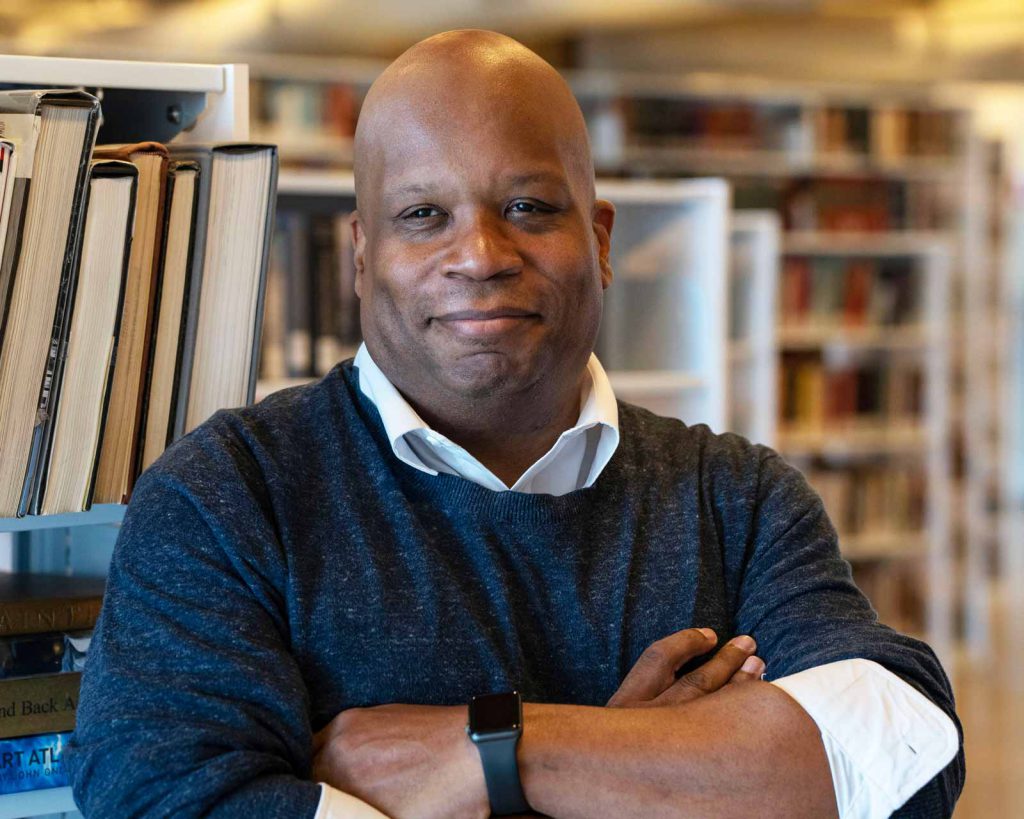BY CHRISTIANNA McCAUSLAND

BIO
Yale Gordon College of Arts and Sciences
Dr. Steven Dashiell, B.A. ’07, remembers working in human services just a few blocks from The University of Baltimore campus and watching the students on their way to class. It was a bittersweet sight for Dashiell, who did not put as much effort into his first bachelor’s degree program as he felt he could have. Those students inspired him to sign himself up for another. Graduating from UBalt with a B.A. in Community Studies and Civic Engagement, he went on to the University of Maryland, Baltimore County (UMBC), completing a master’s degree in Applied Sociology, followed by a doctorate in Language, Literacy and Culture.
“None of that would have happened without the University of Baltimore,” says Dashiell of his extensive academic achievements. “The University gave me a chance at redemption, I guess I’d call it…And now I’m a Ph.D.—I’m a doctor—because of UBalt.”
His time at UBalt “definitely informed me as a scholar, as someone who is involved in looking at the social world.” He said the school was particularly adept at helping students form a community-minded perspective. Now a postdoctoral fellow in sociology at American University, Dashiell’s work as a behavioral scientist looks at male-dominated subcultures and what happens when other populations enter those spaces.
“ The University gave me a chance at redemption, I guess I’d call it…And now I’m a Ph.D.—I’m a doctor—because of UBalt.”
“Social integration is something that’s very important to my research and something that Baltimore models,” he said. “I commonly go back to this idea of a confederation of communities rather than one big city. And it informs the way that I understand how subcultures and micro-cultures work.”
Dashiell, who happens to be an Army veteran, knows a few things about male subcultures. His dissertation examined how male students who were also veterans perceived their masculinity, and how the powerful set of norms taught by the military informed those students’ interactions on campus. It was also during his time at UMBC that he first found the world of online gaming.
“This was back when The Ricki Lake Show was still on and they were having episodes themed like, ‘Our marriage is breaking up over World of Warcraft,’” he recalls. Having never played the game, Dashiell went to his adviser (whom he didn’t realize just happened to be one of the foremost authorities on game studies) and mentioned he wanted to examine World of Warcraft. She told him to download the game and start playing, which he did on a Sunday.
“I called in sick at work for two days and didn’t stop playing until Wednesday,” he said laughing.
Global online gaming is a multibillion-dollar industry. And most of the games fueling that growth—like Skyrim and Diablo—are geared toward men. More specifically, mostly white, middle-class men. And it is those men who are establishing the accepted norms of play in online gaming, says Dashiell. Yet, there have been women and minorities active in the gaming space since its inception. They are just invisible.
“Individuals, whether it be poor white men, or Black men, or women of any racial or social class, they have to learn certain norms and practices in order to act in these spaces,” he says. “In order to operate, individuals need to learn how to engage in the games like men or they get attacked.”
In games where players converse over headsets, for example, researchers have found that when a male player makes a mistake, other players gloss over the error. When a woman falters in the same way, other players call her stupid. Women also report being attacked for displays of femininity.
Currently, Dashiell is working on papers looking at what motivates men who play Diablo in “hard core” mode, which erases all their game progress and resets them to the beginning if they make a single game error. He’s also conducting a study of how Black men in America speak about themselves online and how they perceive themselves and their experiences online through the study of Reddit posts.
Much of Dashiell’s work looks at the intersections where male subcultures meet race, gender and societal norms. In the end, he hopes his work will contribute to sentiment change, which he describes as the shift that happens when a given culture identifies that a behavior is bad. “It doesn’t necessarily mean that any policies or any practices in society change,” he said.
“Sentiment change takes a long time, and social change doesn’t happen until 50 years after sentiment change,” he continued. “So, trying to change something within your lifetime is a very, very difficult thing. Sentiment change is probably the best thing that you can hope for.”
As a “humanistic social scientist,” Dashiell isn’t out to fix society’s problems, but rather to bring increased awareness to what is happening in a deep and thoughtful way—one that inspires conversations outside academic bubbles that may lead to sentiment change and yes, hopefully one day, even social change.
Read “What Grand Theft Auto Tells Us About the ‘Crisis in Masculinity'” (Scientific American) and other articles by Steven Dashiell at Academia.edu.
Baltimore-based writer Christianna McCausland is a regular contributor to the magazine.
